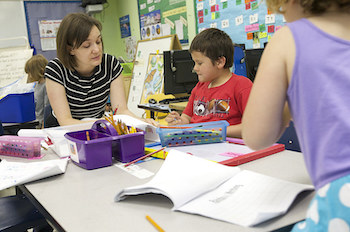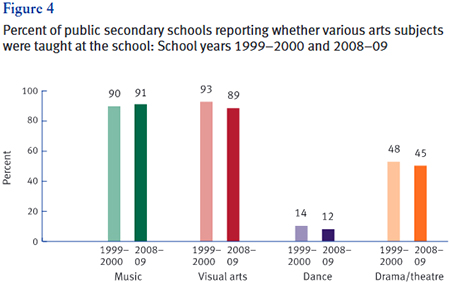5 Ways Modern Schooling Is Making Students Dumber

School is the cornerstone of civilization. Feral children go in one end, and after 12-16 years of learning the dates of famous battles, a well-rounded adult comes out the other. At least, that's the theory -- one we assume is foolproof, because teachers are always right. Right? But no, sometimes the institutions that are supposed to make us smart use the dumbest ideas to do it. For example ...
Homework Isn't Just Pointless; It's A Health Hazard
According to most educational experts, the standard for homework should be the ten-minute rule -- i.e. absolutely no more than 10 minutes per grade per night, with kindergartners getting no homework at all. But lo and behold, research has found that on average, first-graders get three times as much homework as recommended, while kindergartners are getting 25 minutes of assignments, when the only things they should be taking home from school are crappy drawings and head lice.
And homework overload isn't just pointless busywork, but downright toxic. Many studies have shown that, especially in elementary school, homework doesn't improve scholastic achievement. In fact, it's likely causing the opposite. For young students, too much homework is "detrimental to their attitude about school, their grades, their self-confidence, their social skills, and their quality of life," according to pediatric clinical director Stephanie Donaldson-Pressman. It doesn't matter whether you're going the extra mile for corporate or Mrs. Sing in third grade; being forced to work in your off-time is a surefire path to burnout.
And that also applies to the parents helping with homework, who feel the same stress and anxiety from having to spend hours a week as an unpaid substitute teacher. All this time, the graffiti in the school bathroom was right. Homework sucks.
Related: 5 Reasons You Hated School (That You Were Right About)
School Starts When Teens Are Still In Sleep Mode
In case you haven't noticed their mutating skin and wildfire hormones, teens are biologically different from both kids and adults. And that also applies to their circadian rhythm. Our bodies produce the hormone melatonin to regulate sleepiness. As kids, melatonin secretion starts knocking us out in the early hours of the night, which is why babysitters have so much free time to mess up your Netflix algorithm. But during puberty, this nocturnal melatonin downer is delayed by several hours, making it difficult for teens to fall asleep before 11 p.m.
With that shift in their sleep cycle, the America Academy of Pediatrics advises that these growing bodies should not be dragged out of bed until 8 a.m. at the earliest. But because that timing's slightly inconvenient for adults (who've all forgotten what it's like to be a teenager), society doesn't care. According to the Centers for Disease Control, 73% of teens get under eight hours of sleep a day, and a staggering 43% get under six hours. Meaning almost three out of four teens are shuffling around taking exams and handling saws in shop class while chronically sleep-deprived.

So teens aren't lazy or feckless. They're several years into an insomnia bender. And the effects on their school performance are both drastic and utterly avoidable. Research shows that the bump from shifting the school schedule forward by just an hour would boost the national average performance in math by 6%, while reading comprehension would go up by 4%. That's "new teacher in a Lifetime movie" levels of instant improvement, plus educators would get an extra hour of sleep too. We're surprised this isn't already a union demand.
Related: 6 Ways Society Is Designed To Screw Teenagers Every Day
Learning Styles Are Unscientific And Counterproductive
Surveys have shown that up to 97% of teachers believe tailoring lessons to students' learning styles gets better results. Schools spend tons of their precious funding on seminars and consultants to help teachers unlock their classrooms' neurological cheat codes. Some go so far as making students wear badges, like the lamest possible version of Hogwarts.

But this is about as scientific as designing a math class for Scorpios. Neuroscientists have been explaining for years that this is a "neuromyth" based on a bad layman's understanding of how brain centers work. And while individual students might prefer certain types of learning over others, study after study has shown that tailoring lessons based on sensory style makes as much sense as basing them on imaginary animals in the stars.
Instead, the scientific community advises educators to teach in a style that best suits the material, not the students. And we should hurry to implement that, because the learning style framework may not just be useless, but downright dangerous for developing minds. Some experts believe that telling a young student that they're only smart in one specific type of environment can badly hurt their self-esteem. So well-meaning teachers trying to get everyone involved may wind up pulling a reverse Dangerous Minds, accidentally convincing their students there's only so much they can achieve when putting their very limited minds to it.
Related: 23 Statistics About School That Should Make You Lose Sleep
Arts Classes Are Way Too Important To Cut
Schools in low-income districts like inner cities and rural areas are often forced to cut classes due to small budgets. Just like in gym class, it's always the creative ones that get cut first. A U.S. government study in 2012 showed that 1.3 million elementary students and 800,000 high-schoolers received no music lessons whatsoever, with similar numbers for the visual arts. And in some states, as many as one in three public school kids will never have the opportunity to make a Mother's Day ashtray or badly recite a Shakespeare poem while their voice is still breaking.

This doesn't just make them worse students, but worse human beings overall. Studies show that low-income students who get an arts education stay informed, volunteer, and vote in greater numbers. It also makes them more empathetic and tolerant toward other cultures. It's almost as if a well-rounded education creates well-rounded individuals. High-arts, low-income students are also almost twice as likely to want to go to college, where they're three times more likely to earn a bachelor's degree. Probably in something pointless -- like art.
Related: 5 Feel-Good School Programs With Horrifying Consequences
The Youngest Kids In A Grade Keep Getting Misdiagnosed With ADHD
Over the past two decades, ADHD diagnoses for young children have gone up a staggering 40%. Roughly one in every ten kids today is slapped with the label. But doctors noticed that a lot of these wall-bouncers had one thing in common: They were the youngest in their class. Typically, the cutoff age for starting school is a mere day before the year commences. This means kids born 363 days apart wind up in the same class. And nowhere is that gap more noticeable than in kindergarten or first grade, where children are still aging in dog years. Compared to a feral being aged four years and two days, a five-year-old's behavior is almost stately.
Yet teachers only see their youngest students unable to engage or concentrate, as if that's not perfectly reasonable behavior for someone who was a toddler not a year prior. These concerns are then passed on to parents, who pass them to diagnosis-happy doctors. As a result, medical studies have observed that kids born in the last month of the yearly cutoff are over-diagnosed with ADHD by a whopping 30-34% compared to their slightly older peers. They then also receive disproportionately heavy treatments for their relative age. This is so worrying that experts are now encouraging parents to hold their sweet summer children back a year, if only so the system won't pump them full of concentration meds for the temerity of acting their age.
V.R. Craft wrote a comedy called Fail to the Chief, about a reality show to elect the president. She also wastes times on social media and writes science fiction, humor, and satire on her blog, Sharable Sarcasm. Christian Markle wants you to check out these cute comic strips.
For more, check out If High School And College Textbooks Were Honest:
Follow us on Facebook. Because we love you.